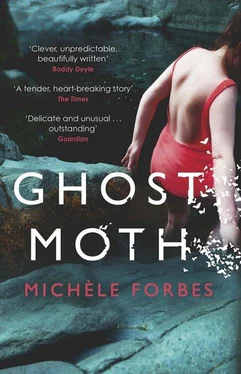George places his foot on the accelerator and, turning his head away, moves the car quickly forward. He sees the young man in his rearview mirror staring after the car, surmising whether he has just missed an opportunity to make a point.
Over the weeks and months to come, George will make his journey back and forth to the Royal Victoria Hospital, sometimes alone, sometimes with the three girls in the back of the car, rarely with Stephen in tow — a pilgrimage to the woman he loves — wondering to himself if there would come a time when such a young man would need no such moment of deliberation, no such moment of weighing up before he brought the broken bottle down upon a face, or pulled the trigger of a gun, or smashed the window of a car and dragged out the driver and beat the driver in front of his children.
Katherine has been discharged from hospital to spend some time at home. With her treatment here has come a remission and Katherine has appeared stronger, but she is still far from well. However, the hospital team feel that it would be a good thing for Katherine and the family to spend Christmas together and they have talked George through the administration of her medication.
Katherine’s bedroom has been prepared and readjusted to cater to her disappearing body. New pillows have been settled at the headboard to provide a spine for her so that she may sit up. All clutter has been cleared away from the bedside table so that her reach, feeble as it is, will not become easily confused. On the table George has placed a glass and a little jug of water, tissues, and Katherine’s morphine and laxatives.
A few magazines and books are placed on the shelf of the bedside table, and around the picture frames that hang on the wall in the room some golden tinsel has been draped. On the windowsill stand three “Welcome Home” cards.
Elsa can see that her father is greeting Katherine’s homecoming with a mixture of excitement and dread. He is at sixes and sevens. He takes the little paraffin heater from the garage up to the bedroom, now worrying that the oily fumes that it releases will aggravate Katherine’s breathing. But the room will be too cold without it, he keeps saying. He has moved Stephen’s cot into the girls’ bedroom, which is now cramped for space. To the gray woolen throw on the back of the sofa in the back room, her father has also added a blanket in case, he says, his presence in his own bed beside Katherine is too uncomfortable for her.
But now on the day of Katherine’s return, amid her slow dance from one room to another, she insists that she sleep in the girls’ bedroom at the front of the house and that the girls and Stephen sleep in the back bedroom.
As her father moves the furniture, Elsa can detect that his anger has a distinctive disappointment to it. He is stretched to his limits and has no tolerance left. He appears angry with Katherine for wanting the furniture moved, angry with her for moaning and complaining, angry with her most of all for being sick. He pushes the children’s beds together sharply, the carpet buckling underneath from the rough movements, and then he squeezes in Stephen’s cot just behind the door. It is all awkward and wrong. The door cannot open fully now and there is no room to move. He has upended their double bed on the small landing and now struggles to angle it through the door of the front bedroom. It lands with an unmerciful crash. He arranges all the bits and pieces Katherine needs, once again, on the table beside the bed. He stops for a moment. He is breathless and tired, but he turns to Elsa and nods his head and gives her a small smile, as though to say, “Thank God she’s home. Thank God your mother is home.”
When Christmas morning comes, the three girls keep their voices down lest they disturb their mother. It is four o’clock in the morning and still dark. In the cramped back room, there is a conspiratorial air among them as they slip their hands into their stockings to find what Santa Claus has left them. A mandarin orange, bubbles, chocolate coins, a skipping rope. They giggle quietly and communicate in fast, fractured whispers, only to fall guiltily silent as they remember — and remind one another — that they must not wake their mother.
The day moves by as though it were a strange story unfolding. They are enjoying Christmas Day, but it has never been this static, nor this careful.
Later that afternoon, Katherine is lying on the brown leatherette sofa in the back room. She is wrapped in the gray woolen throw with its mint green edges, and the two-bar electric fire is on beside her. Maureen, Elizabeth, and Elsa play “What’s the time, Mr. Wolf?” in the back garden. Their voices are crisp and light as they play. Elizabeth and Elsa are poised and ready to run and Maureen is ready to catch them. The snow that had fallen during the very early hours of the morning is still powdery and soft and the world appears to have been made quieter by it. Stephen has so many layers of clothes on him, he totters around like a little snowman. His woolly hat has slipped down over his eyes and his arms are stretched out in front of him. Together the children are an oil painting of a winter scene. The snow graces their Wellington boots, their cheeks glow crimson, and Katherine is now not at the kitchen window to watch them.
But soon the children come back into the house, as though they sense that without their mother there to offer witness, their play means nothing. George helps Stephen out of his coat and boots while the girls quietly collect their model village of Applewood Green from their bedroom to bring downstairs. They settle together in the back room and begin to arrange the painted plastic houses and people.
“Mummy, can we use your legs to make hills and things?” Elsa asks.
“Give your mother some space, girls. Let her rest.” George is concerned the children will tire Katherine out.
“No, really, it’s fine,” Katherine reassures George.
With Stephen watching, his lips pouting in concentration, the girls gather around Katherine as she lies on the sofa and lay out the village on top of the gray woolen throw. They push Mrs. Dainty’s post office into a small dip in the blanket and rest Dr. Broom’s surgery on top of their mother’s knee. They place Mr. Fennel’s fishmonger shop near their mother’s abdomen, where the blanket flattens slightly, and put Willy Miller’s mill down near her toes. Soft channels in the blanket provide roads on which the villagers can travel. And all roads lead to Her. The villagers can bring Katherine anything she needs now. Micky Muffin, the baker, is on his way with fresh bread and scones, and Tommy Topper brings milk and cream. A road curves down from Katherine’s thigh, which, although too narrow for the motorcar or the truck, allows Mrs. Cinnamon’s width. The chemist’s wife glides toward Katherine, holding her baby at her breast, and brings cough mixture, some perfumed bath salts, and gossip from the village.
“Did you hear poor Mrs. Dainty has lost her puppy? Oh dear, isn’t it awful. And then there’s Private Dooley, whose mother bought him a different-colored glove for each hand so that finally he can tell his left from his right. How about that? And then of course Dr. Broom, who is away on an emergency call at the moment, said very clearly that you’re going to be as right as rain. All you need is some of Farmer Meadows’ lovely fresh eggs. And can you believe it — here comes Farmer Meadows right now.”
Farmer Meadows approaches, courtesy of Maureen, with his wonderfully fresh farm eggs and offers them to Katherine.
“Thank you very much, Farmer Meadows,” says Katherine.
“No eggs,” Stephen says with a frown on his face, pointing to the little plastic figure of Farmer Meadows.
“We’re just pretending,” explains Elsa patiently. “Here, you bring Willy Miller over to see Mummy.” Elsa hands Stephen the figure of Willy Miller.
Читать дальше












